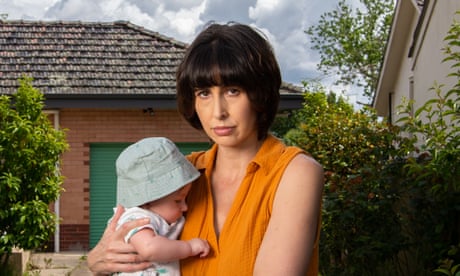- by foxnews
- 23 May 2025
Australians turning to buy now, pay later schemes for groceries ‘stuck in a revolving door’ of debt
Australians turning to buy now, pay later schemes for groceries ‘stuck in a revolving door’ of debt
- by theguardian
- 08 Nov 2022
- in news

When Brooke Haebich and her partner had their first child they struggled to afford groceries, but initially they thought they had found a lifeline in Afterpay.
They began buying $200 gift cards for Woolworths or Coles on the buy now, pay later scheme, and would then pay off the amount in four fortnightly instalments of $50. But after a while, paying for essentials by going into debt was like being stuck in a revolving door, Haebich says.
"It's a life saver in that moment," she says from her home in Wangaratta. "But then your pay starts going towards repaying what you've spent, so then the cycle begins; you haven't got enough money to get groceries, so you use Afterpay again to get another card."
Financial counsellors say more and more people have turned to BNPL services to afford essentials such as food, petrol, and bills since petrol prices suddenly shot up in February. They expect the numbers to climb further as cost of living pressures bite.
Claire Tacon, a financial counsellor at the Consumer Action Law Centre, says an increasing number of people calling the National Debt Helpline have been sucked into a debt spiral after turning to BNPL, leaving them in a worse financial position than before they began using the scheme.
"Payments for these accounts are always direct debited so the company gets the money first, then people don't have enough to feed themselves and look after their health, so they just keep reborrowing," she says.
Haebich says at times she and her partner had two or three different Afterpay instalments direct debited from their account to pay for various grocery gift cards. This ate into their fortnightly budget, causing them to run late on rent and bills.
The chairman of the Australian Securities and Investments Commission, Joe Longo, said last week cost of living pressures had pushed people towards fringe sources of credit, including BNPL, that could be harmful.
As of June, there were 5.9m active BNPL accounts in Australia. Demand for BNPL services slowed in the September quarter, according to Equifax, but had risen by 10% from a year earlier.
One in seven users of BNPL services had more than 20 loans last year, the consumer group Choice has found.
Deb Shroot, from Financial Counselling Australia, says BNPL services have become an attractive option because they are not required to conduct credit checks to the standard of responsible lending laws.
"The problem with this is [the companies] are not actually checking that people who are using their products are actually able to repay back the loans that they're taking out," Shroot says.
Several people, including some receiving welfare, told Guardian Australia the companies frequently asked if they wanted to increase their borrowing limit beyond what they thought they could afford.
"They keep offering me to increase the limit every time I pay it off," says Naomi Thompson, who lives on JobSeeker payments that are sometimes supplemented by casual work. "But the minimum repayments would increase beyond what I could afford on JobSeeker, so it would not be helpful or useful for me."
Haebich says she knew using Afterpay was not a smart financial choice while she was in a rut, but she felt like a "carrot was being dangled in front" of her when her limit was increased.
Zip, another BNPL provider, says it carries out credit checks on customers and does not increase limits unless it is requested by the customer.
Afterpay says it increases limits if customers pay on time, but they can always contact customer service to reduce the limit.
A spokesperson said the company did not conduct credit checks, but unlike credit cards it froze a customer's account as soon as a payment was missed. In the second quarter of this year, they said, 98% of Afterpay purchases incurred no late fees and 95% instalments were paid on time.
Financial Counselling Australia and the Consumer Action Law Centre argue BNPL providers should adhere to the same responsible lending laws as other providers of credit.
Afterpay says it is regulated as a member of the Australian Finance Industry Association Limited.
Both Zip and Afterpay have adopted the Buy Now Pay Later Code of Practice, which the Afterpay spokesperson said had standards beyond that of traditional credit.
Both Zip and Afterpay say they have a financial hardship program which allows customers to go on a payment plan if they are struggling to make repayments.
Haebich, who is now on a payment plan to repay her Afterpay debt, says she still sometimes uses Zip to afford groceries.
"We'd be up shit creek another way had we not used Afterpay, so I don't blame them that I'm in this position," she says.
- by foxnews
- descember 09, 2016
United Airlines flight returns to Hawaii after concerning message found on bathroom mirror; FBI investigating
United Airlines Flight 1169 to Los Angeles returned to Hawaii after a "potential security concern" aboard the plane. The FBI and police are investigating.
read more


